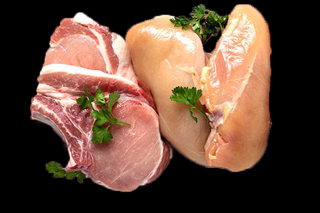
Red and White Meats Are Equally Bad for Cholesterol
We’ve all been fed a lie when it comes to heart health recommendations.

Bad news for all of the meat lovers out there: White meat is not a healthier option than red. In fact, consuming high levels of red and white meat has roughly the same negative effect on cholesterol, concludes a new study published in the American Journal of Clinical Nutrition.
The finding upends years of guidelines that recommend limiting red, but not white, meat consumption to lower cardiovascular disease risk. The researchers, who said in a statement they were “surprised” by the results, concluded plant-based protein is the healthiest option for heart health.
Red meat gets its nickname from its high levels of myoglobin, a protein that appears red when exposed to oxygen; goat, lamb, pork and beef (either cow or buffalo) belong to this category. White meat is a colloquial term for meats low in myoglobin; chicken, turkey and other poultry are considered white meats. Until now, red meat has been viewed as the main threat to health due to its comparatively higher levels of saturated fat, which increases LDL (bad) cholesterol and, thus, risk of heart disease.
But this stance was based primarily on observational studies, the new study notes. Large-scale reviews of controlled trials have previously hinted that red and white meat have a similar effect on blood cholesterol, but most trials didn’t take into account participants’ total consumption of saturated fats. Any fluctuation in an individual participant’s cholesterol level during these studies could have been due to other sources of saturated fat, just as much as it could have been due to meat, making it difficult to draw hard conclusions.
Related on The Swaddle:
How Much Protein Do You Really Need?
The recent study, by researchers at the Children’s Hospital Oakland Research Institute in the U.S., is the first to control for total saturated fat consumption across three diets: one high in red meat, one high in white meat, and one high in plant-based proteins such as vegetables, dairy, beans and other legumes. This allowed them to conclude there’s something about consuming meat – red or white – that contributes to higher blood cholesterol above and beyond the meat’s saturated fat content.
The study did not include fish (known to be low in saturated fats) or grass-fed beef, touted as leaner than grain-fed beef, or processed meats such as bacon or sausage, which are known for their high saturated fat content and link to cardiovascular disease.
“Our results indicate that current advice to restrict red meat and not white meat should not be based only on their effects on blood cholesterol,” Dr. Ronald Krauss, the study’s senior author, said in the statement. Dr. Krauss is senior scientist and director of Atherosclerosis Research at Children’s Hospital Oakland Research Institute. “… effects [other than higher cholesterol] of red meat consumption could contribute to heart disease, and these effects should be explored in more detail in an effort to improve health.”
Liesl Goecker is The Swaddle's managing editor.
Related


Chronic Pelvic Pain is More Than Just Period Cramps
